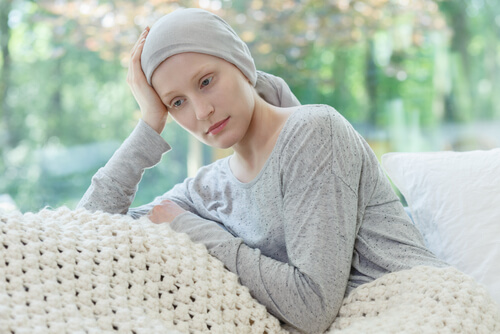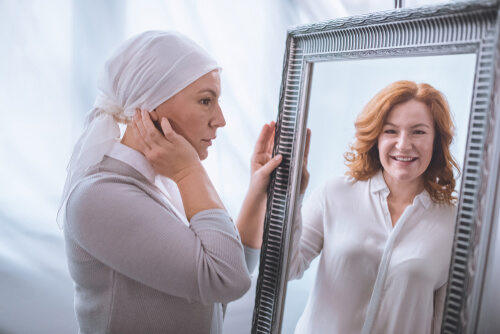Gynecologic Cancer and Anxiety

Do female cancer patients suffer more than male cancer patients? This is the question that we’ll try to answer today by looking at studies about changes in mood and anxiety in gynecologic cancer patients. This analysis will help determine if a gender-based approach to cancer could be beneficial for patients.
Cancer, in any of its forms, is a stressful life event that affects every aspect of a patient’s life. Many factors have an influence on the unique experience of each cancer patient: the support of their family and social circle, age, available resources, etc. Scientific literature also suggests that gender can play a role in the patient experience.

The differences in the cancer experience for men and women
The sensibility towards particular types of cancer is different between men and women. This may be relevant when it comes to understanding why a gender-based perspective is important.
Borras (2015) states that gynecologic tumors (when breast cancer is included in this category) make up 40% of all tumors in women. For men, only 22% percent of their tumors are due to prostate cancer, followed by lung cancer and colorectal cancer.
Also, there are differences in survival rates between male and female cancer patients. In Spain, the most common type of cancer in women, breast cancer, has an 83.8% five-year survival rate. And while prostate cancer has an 84.7% survival rate, the rate for lung cancer drops to just 10%. Lung cancer accounts for 50% of total tumors found in men. Consequently, it seems that women with cancer die less often than men with cancer, though it’s important to note that the conditions aren’t the same.
The demands of breast cancer
The fact that breast cancer is one of the main causes of death in women makes it relevant regarding cancer treatment. People’s conditions vary, so the demands of their cancer change as well.
In the case of breast cancer, which is the most common cancer in women, gender (which is a social and cultural category) seems to play an important role.
According to Canicali, Goncalvez, Pire, Costa, and Costa (2012), breast cancer involves lifestyle changes caused by physical discomfort and alterations in the patient’s self-image.
These authors observed that women with breast cancer also have low self-esteem and a significant reduction in libido.
These authors reference other studies that suggest that there’s a clinically significant prevalence of anxiety and depression in breast cancer patients. They talk about symptoms such as tension, unspecified fear, and general worries.
Concerns of patients in the pre-surgery stage
Olivares (2004) studies the psychological aspects of gynecologic cancer. One of them, anxiety, turns out to be a recovery predictor for post-surgery patients.
Anxiety in breast cancer patients is relevant because, according to this researcher, patients with higher levels of pre-op anxiety had higher levels of post-op pain and discomfort. They also needed more medication and required longer hospital stays.
Salmon (1992), like Olivares (2004), found a positive relationship between pre-op anxiety and the measure of post-op anxiety. He also found a positive linear association with post-op depression.
What are women with cancer worried about?
To better understand breast cancer anxiety, it’s important to study the specific concerns of a woman with breast cancer.
While it’s easy to see that, in general, this illness is a source of stress and fear, a 2018 study conducted by Mota, Aldana, Bohorquez, Martinez, and Peralta identifies the specific factors that generate anxiety in female cancer patients. Some of the main factors are:
- A perception of the closeness of death.
- Mistaken beliefs about cancer.
- The anticipation of your own suffering.
- The anticipation of your family and friend’s suffering.
- A sense of losing control.
- A belief crisis and a need to transcend.
- Being overly cautious or not cautious enough.
- A lack or excess of stimulation.
- Medical conditions: low energy, nausea, anorexia, vomiting, etc.
The kind of anxiety a patient will experience is different depending on their age and the type of cancer they have. For example, women who have undergone a mastectomy often report frustration, sadness, and anxiety and depression disorders.
For breast cancer patients, the type of anxiety they experience often gets in the way of their family and social lives.
Body image and sexuality after cancer
Many cancer patients experience anxiety on top of the illness they already have. In addition, women with gynecologic cancers experience physiological changes that play an important role in their post-cancer well-being.
According to Garcia-Viniegras and Gonzalez (2007), self-confidence, emotional stability, strength, positive emotions, and self-esteem condition a person’s self-esteem over the course of their life. After cancer, many women struggle with some of these factors.
Sebastian, Manos, Bueno, and Mateos (2007) argue that, while cancer usually involves surgery and often results in physical changes, the psychosocial connotations of those physical changes can be particularly significant for women.
That’s because, in our society, breasts are important for femininity. Many women feel, for example, that losing one of their breasts means that they’re losing what it means to be feminine.
Not only that but breasts seem to play a crucial role in a woman’s ability to attract and keep sexual partners. Undergoing surgery or treatment for breast cancer usually affects that in some way.

Are breast cancer patients the only ones with sexuality issues?
Women with any kind of gynecologic cancer can experience sadness, image problems, sexuality issues, and anxiety. These issues aren’t exclusive to breast cancer patients.
Olivares (2005) discusses depression, anxiety, and chronic sex issues in cervical cancer patients five years after treatment. The study showed that, for uterine cancer patients, 55% of women had difficulties with sex and 33% of women didn’t have sex at all after treatment.
Mental health is crucial for gynecologic cancer patients’ physical health
Every medical treatment involves different circumstances for the patient. We’ve seen that fear, sadness, anxiety, and low self-esteem are common factors for patients with gynecologic cancers.
It’s also important to point out that these psychological changes can actually have an impact on how the disease develops. With that in mind, it’d seem all the more crucial to make sure that female cancer patients get the proper mental health care as well.
Treatment shouldn’t just include chemotherapy. Women need resources for dealing with the anxiety they feel before any medical intervention; mental health education programs to break down conventional myths, such as the belief that a woman’s breasts and vagina define her sexuality and femininity; and make self-confidence and self-esteem building part of the treatment goals.
The ultimate goal shouldn’t just be the patient’s physical health but her general well-being.
All cited sources were thoroughly reviewed by our team to ensure their quality, reliability, currency, and validity. The bibliography of this article was considered reliable and of academic or scientific accuracy.
- Borràs, J. (2015). La perspectiva del género en el cáncer: una visión relevante y necesaria. Arbor, 191(773): a231.
- Caniçali, C., Nunes, L., Pires, P., Costa, F., y Costa, M. (2012). Ansiedad en mujeres con cáncer de mama. Enfermería Global, 28, 52-62.
- García-Viniegras, C. y González, M. (2007). Bienestar psicológico y cáncer de mama. Avances en Psicología Latinoamericana, 25, 72-80.
- González, C., Calva, E., Bohorquez, L., Medina, S. y López, J. (2018). Ansiedad y calidad de vida en mujeres con cáncer de mama: una revisión teórica. Psicología y Salud, 28(2), 155-165.
- Olivares, M. (2004). Aspectos psicológicos en el cáncer ginecológico. Avances en Psicología Latinoamericana, 22, 29-48.
- Sebastián, J., Manos, D., Bueno, M. y Mateos, N. (2007). Imagen corporal y autoestima en mujeres con cáncer de mama participantes en un programa de intervención psicosocial. Clínica y Salud, 18(2), 137-161.
This text is provided for informational purposes only and does not replace consultation with a professional. If in doubt, consult your specialist.








